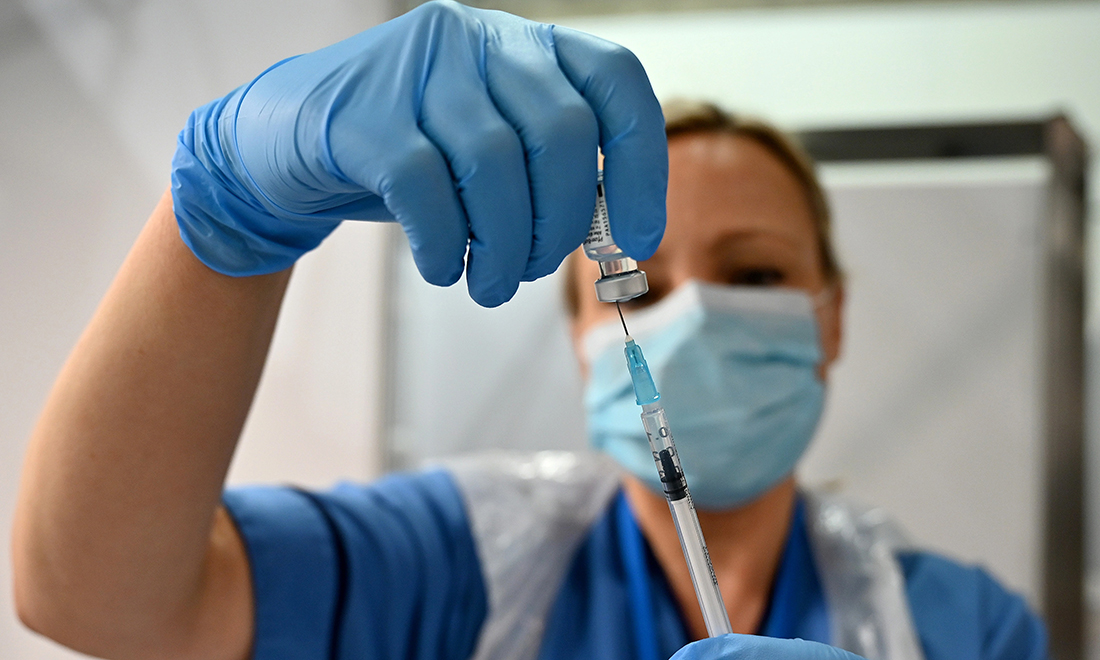
英國人口的高抗體保護率正在下降。業界警告稱,進入“危險”的冬季時,英國人口的免疫力將達不到抵抗新冠病毒的水平。
英國國家統計局(Office for National Statistics)在今年8月10日公布的最新數據顯示,體內病毒抗體水平較高的人數迅速減少。
根據英國國家統計局的標準,高水平抗體是指每毫升血液中抗體超過800納克(ng)。
英國國家統計局的最新數據顯示,在7月11日至7月17日期間,擁有高水平抗體的英國人占總人口的71.7%,與一周前相比減少了1.4%。
相關數據樣本來自英國16歲以上的10,234人。
全英國的情況基本相似,蘇格蘭、威爾士和北愛爾蘭擁有高水平抗體的人數占比也在下降。
英國國家統計局的研究從2020年12月開始,當時英國成年人中只有0.7%抗體水平較高。
數據顯示,今年3月英國擁有高水平抗體的人數達到峰值,當時英格蘭82%的人口抗體保護水平較高。
8月10日的數據顯示,英格蘭各地擁有高水平抗體的人數較3月的峰值下降了12%。
英國國家統計局指出,5月曾經調整研究方法。然而,數據的趨勢與之前保持一致。
同時數據顯示,英國設定的抗體基準水平為每毫升血液至少含179納克抗體,該標準在德爾塔變異病毒高峰時期確定,人數相對穩定。抗體達到基準水平的人群比例與前一周相比保持不變,而且自3月中旬以來幾乎沒有變化。
未來的“危險”時期
2020年12月,英國是全世界第一個臨床試驗后實際接種新冠疫苗的國家,英國向所有成年人推廣加強針計劃之后,3月英國人群抗體水平達到高峰。
今年春天,75歲以上和免疫系統較弱的人群可以注射第二針加強針。
在英國12歲以上的人群里,共87.9%接種了兩劑新冠疫苗。每10人就有7人注射過加強針。
雖然英國制定計劃秋季為某些人群(包括50歲以上的人、一線醫護人員和免疫功能不全者)提供加強針,但尚未宣布向更廣泛人群提供額外加強針。
《財富》雜志就此聯系了英國政府發言人,該發言人并未立即發表評論。
8月11日,倫敦醫學實驗室(London Medical Laboratory)的首席測試專家兼首席科學官昆頓·菲韋爾曼博士在新聞稿中表示,進入“危險的冬季”時,人們體內需要保持較高的抗體水平。
“英國新冠抗體較高的人數大幅下降12.7%,顯然令人擔心。”他說。
菲韋爾曼補充稱,現在英國新冠抗體防護水平較高的人數可能已經不到70%。
“簡單說點事實,如果擁有高水平抗體的人數繼續加速減少,第一批英國成年人就又要等到10月才開始注射加強針,屆時高水平抗體人群占比將只有60%。”他警告道。
菲韋爾曼告訴《財富》雜志,倫敦醫學實驗室的研究表明,接種疫苗三個月后產生的免疫力就會大幅下降。他補充說,無論接種哪種疫苗情況都一樣。
“越發讓人擔心的是,新的奧密克戎BA.4和BA.5亞型產生的免疫應答不如之前的變異,因此再次感染的可能性加大。”他說。“保持高水平抗體對于壓制病毒、防止感染和控制病毒傳播至關重要。”
菲韋爾曼的評論也呼應了此前美國的頂尖醫學專家安東尼·福奇的警告,福奇曾經表示,如果有人在秋冬季節還未及時接種新冠疫苗,就會“有麻煩”。(財富中文網)
譯者:梁宇
審校:夏林
英國人口的高抗體保護率正在下降。業界警告稱,進入“危險”的冬季時,英國人口的免疫力將達不到抵抗新冠病毒的水平。
英國國家統計局(Office for National Statistics)在今年8月10日公布的最新數據顯示,體內病毒抗體水平較高的人數迅速減少。
根據英國國家統計局的標準,高水平抗體是指每毫升血液中抗體超過800納克(ng)。
英國國家統計局的最新數據顯示,在7月11日至7月17日期間,擁有高水平抗體的英國人占總人口的71.7%,與一周前相比減少了1.4%。
相關數據樣本來自英國16歲以上的10,234人。
全英國的情況基本相似,蘇格蘭、威爾士和北愛爾蘭擁有高水平抗體的人數占比也在下降。
英國國家統計局的研究從2020年12月開始,當時英國成年人中只有0.7%抗體水平較高。
數據顯示,今年3月英國擁有高水平抗體的人數達到峰值,當時英格蘭82%的人口抗體保護水平較高。
8月10日的數據顯示,英格蘭各地擁有高水平抗體的人數較3月的峰值下降了12%。
英國國家統計局指出,5月曾經調整研究方法。然而,數據的趨勢與之前保持一致。
同時數據顯示,英國設定的抗體基準水平為每毫升血液至少含179納克抗體,該標準在德爾塔變異病毒高峰時期確定,人數相對穩定。抗體達到基準水平的人群比例與前一周相比保持不變,而且自3月中旬以來幾乎沒有變化。
未來的“危險”時期
2020年12月,英國是全世界第一個臨床試驗后實際接種新冠疫苗的國家,英國向所有成年人推廣加強針計劃之后,3月英國人群抗體水平達到高峰。
今年春天,75歲以上和免疫系統較弱的人群可以注射第二針加強針。
在英國12歲以上的人群里,共87.9%接種了兩劑新冠疫苗。每10人就有7人注射過加強針。
雖然英國制定計劃秋季為某些人群(包括50歲以上的人、一線醫護人員和免疫功能不全者)提供加強針,但尚未宣布向更廣泛人群提供額外加強針。
《財富》雜志就此聯系了英國政府發言人,該發言人并未立即發表評論。
8月11日,倫敦醫學實驗室(London Medical Laboratory)的首席測試專家兼首席科學官昆頓·菲韋爾曼博士在新聞稿中表示,進入“危險的冬季”時,人們體內需要保持較高的抗體水平。
“英國新冠抗體較高的人數大幅下降12.7%,顯然令人擔心。”他說。
菲韋爾曼補充稱,現在英國新冠抗體防護水平較高的人數可能已經不到70%。
“簡單說點事實,如果擁有高水平抗體的人數繼續加速減少,第一批英國成年人就又要等到10月才開始注射加強針,屆時高水平抗體人群占比將只有60%。”他警告道。
菲韋爾曼告訴《財富》雜志,倫敦醫學實驗室的研究表明,接種疫苗三個月后產生的免疫力就會大幅下降。他補充說,無論接種哪種疫苗情況都一樣。
“越發讓人擔心的是,新的奧密克戎BA.4和BA.5亞型產生的免疫應答不如之前的變異,因此再次感染的可能性加大。”他說。“保持高水平抗體對于壓制病毒、防止感染和控制病毒傳播至關重要。”
菲韋爾曼的評論也呼應了此前美國的頂尖醫學專家安東尼·福奇的警告,福奇曾經表示,如果有人在秋冬季節還未及時接種新冠疫苗,就會“有麻煩”。(財富中文網)
譯者:梁宇
審校:夏林
Rates of high antibody protection are declining in the U.K., prompting warnings that the population will have insufficient immunity levels as it heads into the “dangerous” winter months.
Published on August 10, new figures from Britain’s Office for National Statistics (ONS) revealed that the number of people with a high level of antibodies against the virus was rapidly dwindling.
Anything above 800 nanograms (ng) of antibodies per milliliter of blood is considered a high level, according to the ONS.
The organization’s latest data revealed that 71.7% of the English population had this high level of antibodies between July 11 and July 17—marking a 1.4% decline from a week earlier.
The data included samples from 10,234 people over the age of 16 living in England.
The picture was similar across Britain, with high antibody rates also declining in Scotland, Wales, and Northern Ireland.
The ONS research dates back to December 2020, when it found that just 0.7% of English adults had high antibody levels.
High antibody levels peaked in March this year, according to the data, when 82% of England’s population had high antibody protection.
August 10’s data marked a 12% decline from the March peak in high antibody levels across England.
The ONS noted on Wednesday that its methodology for the study changed in May. However, the trend in the data continued as before.
Meanwhile, the data showed that the U.K.’s baseline antibody level of at least 179 ng per ml of blood—which had been set at the height of the Delta wave of the pandemic—had held firm, with the proportion of the population with this level of antibodies remaining unchanged from a week earlier and showing little change from mid-March.
“Dangerous” times ahead
The U.K. was the first country in the world to administer doses of coronavirus vaccines outside of clinical trials in December 2020, and the peak in high antibody levels seen in March came after the country’s booster program was rolled out to all adults.
People over the age of 75 and those with weakened immune systems became eligible for a second booster dose in the spring of this year.
A total of 87.9% of people in the U.K. over the age of 12 have received two doses of a COVID vaccine. Seven in 10 have had a booster shot.
While there are plans for an autumn booster program for certain individuals in Britain, including the over-fifties, frontline health care workers, and the immunosuppressed, no plans have been announced to extend the additional booster doses to the wider population.
A spokesperson for the U.K. government was not immediately available for comment when contacted by Fortune.
Dr. Quinton Fivelman, lead testing expert and chief scientific officer at London Medical Laboratory, said in a press release on August 11 that populations needed to retain a substantial number of antibodies as they entered “the dangerous winter months.”
“This dramatic 12.7% decrease in the number of people in England with a significant number of antibodies to COVID is obviously concerning,” he said.
Fivelman added that less than 70% of people in Britain were now likely to have high levels of antibody protection against COVID-19.
“The simple truth is that, if this rate of decline continues to accelerate and the first U.K. adults don’t start receiving their boosters until October, only 60% of the population will retain substantial antibodies by the time they are jabbed,” he warned.
Fivelman told Fortune that London Medical Laboratory’s research indicated vaccine-derived immunity waned substantially once three months had passed since vaccination. This was true regardless of which vaccine an individual received, he added.
“One developing concern is that the new Omicron BA.4 and BA.5 subvariants do not produce as high an immune response as the previous strains, so reinfection is more likely to occur,” he said. “Higher levels of antibodies are important to neutralize the virus, stopping infection and limiting people transmitting the virus to others.”
Fivelman’s comments echo a warning from America’s top doctor Anthony Fauci last week that anyone who was not up to date with their COVID vaccinations heading into the fall and winter months was “going to get into trouble.”






